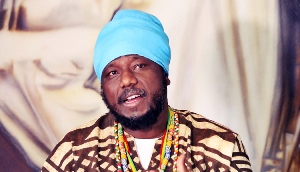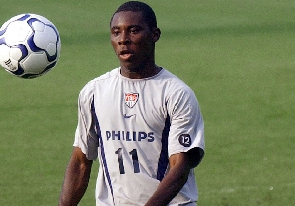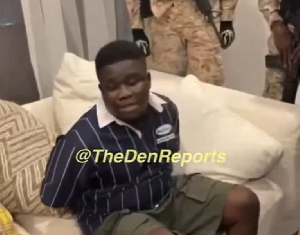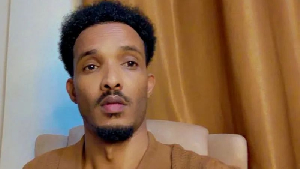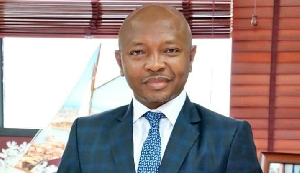One Friday evening late last month, after the rain had come and gone, Freddy Adu drove his black Cadillac sedan into a parking lot in the Locust Point neighborhood of South Baltimore. He walked to a field where some 13-year-old boys in red and white jerseys were kicking around a soccer ball. “There’s Freddy,” one of them said. “Hey, Freddy!”
Soon Adu was leading them through a drill. Each would take a turn sending him a pass and then sprinting off to the right. With a single deft touch, Adu would redirect the ball to their feet. “In front of you,” Adu said. “Not too far. Run at it full speed, Kevin! Run at it, and then shoot.”
Although he hasn’t played for a top-tier team anywhere in seven years, Adu remains one of the most famous soccer players in America. Fans everywhere know his name. If you aren’t a fan of the sport, he might be the only American soccer player you do know.
Adu was the phenom who would save American soccer from irrelevance. At 14, in 2004, he started playing for Major League Soccer’s D.C. United. He starred in a commercial for Pepsi’s Sierra Mist brand with Pele, who compared Adu to Mozart. He signed a Nike deal. He did a “Got Milk?” ad. He was on the cover of a cereal box, and the cover of Time magazine. In 2006, he trained briefly with Manchester United, then the world’s most important club. All of that was years ago, but he’s still recognized in airports.
“It wasn’t like people forgot about him,” says Tommy Olsen, who played with Adu last summer on the Las Vegas Lights of the second-tier United Soccer League Championship. “Everyone still knows who he is.”
As a player, though, Adu’s career didn’t work out as everyone expected. He was supposed to be the next Pele. Instead he became a vagabond, traveling the world in search of a team where maybe he could thrive. In the 13 years since leaving D.C. United, he has played for 13 other teams. Two of them, Philadelphia and Real Salt Lake, were in MLS. Two more were big European clubs: Portugal’s storied Benfica and France’s AS Monaco. Mostly, they were in places you’d end up if you had nowhere else to go.
Adu played for Aris in Greece and Rizespor in Turkey. He played one game for a Serbian team. He played in Finland for KUPS and, after that, for its developmental affiliate. He went to Brazil for two games. He played in the minor league NASL for Tampa Bay. He had unsuccessful trials with Blackpool in England and Stabaek in Norway, with AZ Alkmaar in Holland and MLS’ Portland Timbers. He flew to Poland to sign a contract only to learn that he’d been brought in without the manager’s consent. He tries not to talk about those years in which he was floating from team to team, leaving each under a shadow of disappointment. “You have to have amnesia,” he said. “Otherwise, you’ll torture yourself.”
He ended up in Las Vegas for the 2018 season as a last resort. It was a chance to resurrect his career at 28. That didn’t work out, either. “The fans would chant his name, ‘Freddy! Freddy!'” said someone affiliated with that team’s management. “Then they’d see him play, and they wouldn’t chant anymore.”
Adu wanted to return to Las Vegas this year, especially after Eric Wynalda, the former U.S. national player and Fox commentator, was hired to manage. Wynalda turned him down.
“The reason that Freddy’s not here now, there are six or seven guys getting their first chance or their second chance,” Wynalda said. “He’s on his fourth or fifth. It’s their turn, not his.”
Wynalda, too, had hoped Adu’s career would have turned out differently. “He’s a lot better than what we think he is,” he said. “There’s a lot more to him. But we never saw it.”
Adu was sitting at home in suburban Washington this past November when two friends persuaded him to help their youth club, Next Level Soccer. The plan was that he would come to workouts through the winter and teach the kids how to shoot. It’s June now, and he’s still driving nearly an hour each way to practice sessions near Baltimore, two and three times a week. For the first time in years, he says, soccer is fun.
“This is literally grassroots,” he said, sitting on the bench during a break in the practice. “None of that other stuff. Just the good parts of the game.”
Still, Adu wants to be clear. “Until,” he said. “That’s how I’ve been thinking about this.” In two days, he would turn 30. “I’m still plenty young. I’m not ready to give it up. Things haven’t gone the way that I would have wanted them to, obviously. But I love the sport too much to say I’m ready to give it up.” He still gets inquiries on Facebook, and occasionally through his agent, about his availability.
“I’d like to stay in the States,” Adu said. “I’ve been to some obscure places in my career. I’m not sure if I want to keep doing that. I’d like to play, but I’m hoping that it’s here.”
As he talked, players from Next Level’s under-14 team lined up to kick a ball on a diagonal toward an undersized net some 30 yards away. Most of them looked scrawny. It is hard to fathom, even after all these years, but when Adu was exactly their age, he was starting his pro career. Now he walked over to give them instruction. Strike the ball this way, he said, not like that. Several of the boys were able to get shots close to the goal. One bounced a shot off the near post, but most of them continued to miss by several feet.
Adu stepped up to demonstrate. He sent a kick on an arc. For a moment, the ball shone against the darkening sky. Then it curved into the net. Adu threw his hands into the air. He did a dance, shuffling his feet. “Golazo!” he shouted. “Go-la-zo!”
What went wrong for Freddy Adu? Arnold Tarzy thinks he knows.
Tarzy is the Maryland insurance agent who discovered the 8-year-old Adu playing with older kids in a neighborhood league. Only a few months before, Adu’s family had won the right to emigrate from Ghana in a green-card lottery. Tarzy, who hadn’t played competitive soccer beyond junior high school and started coaching only a few years earlier, became a mentor for Adu, leading him step by step.
In October 1999, the United States Soccer Federation staged a loosely organized youth game on the practice field at American University in Washington. The ostensible purpose was to identify emerging talent for Project 2010, a quixotic effort meant to result in a World Cup victory within a generation. But maybe it was just to see Adu, who at 10 already had made a name as a phenom.
Tarzy was at the game, watching with Bob Jenkins, a USSF staff coach at the time. It had become clear to Tarzy that Adu scored goals simply because he was better than everyone around him. If he had the ball and a defender, or even three of them, to elude, he was almost impossible to stop. But when he didn’t have the ball, he stood around and waited for someone to pass it to him.
Nobody wanted Adu to succeed more than Tarzy. Still, he couldn’t shake the feeling that Adu’s efforts were almost exclusively confined to taking the ball and putting it in the net. He turned to Jenkins. “It doesn’t bother you that he doesn’t work that hard on the field?” he asked.
Jenkins shook his head. “He’s only working as hard as he has to.”
Jenkins was referring to the game unfolding in front of them, but Tarzy was on to something. “It’s a matter of habits,” he says now. “He never had the work rate. He never had to. Things always came easy.”
That would be Adu’s undoing. Against better competition, he foundered. He scored 15 goals in 16 games for the U.S. under-17 national team, and 16 more in 33 games for the under-20s. “He was unbelievable,” said Sammy Ochoa, who played with him at the under-20 World Cup in 2006. “He was great. Skillful. Quick. At that time, there was nobody like him.” But in 17 appearances for the senior national team from 2006 to 2011, Adu only scored twice.
His club career ran a similar course. There were 11 goals to celebrate for D.C. United from 2004 to 2006. But since then, Adu has scored a total of 17 times. That’s 17 goals over the past 13 years, playing across various levels in Europe, Asia, South America and the United States. As a kid, he’d get that many goals in a weekend.
Adu was an attacking midfielder and occasionally a winger, not a striker. “I’m more quick than fast,” he said. But he considered himself a finisher, not a creator. When he wasn’t scoring, he wasn’t doing much of anything. “He saw himself as the luxury player, the skill player,” Wynalda said. “‘Give me the ball and I’ll make something happen.’ ‘OK, I screwed up, give it to me again.’ ‘OK, again. Just keep giving it to me.’ And eventually it’s like, ‘You know what? I’m going to give it to some other guy.'”
Everywhere he went, Adu was his usual easygoing self. He made friends, not enemies. But that sense of entitlement undermined him in locker room after locker room. Since 2006, only two of the 13 teams he played for brought Adu back for a second season. “I think people still see me as that spoiled 14-year-old who came into the league,” Adu says now. “And I did not do myself any favors.”
It wasn’t all his fault. American soccer was still seeking its first international star. Adu happened to be anointed. At the same time, the idea of a 14-year-old playing in a top league against adults captured the imagination of the broader public. “Everyone told him, ‘You’re great. You’re amazing. You got it,'” Wynalda said. Adu signed a $1 million deal with Nike. His D.C. United contract paid him $500,000 more.
“He was touted before it was deserved, and before he was ready to handle it,” said Jason Kreis, who was Adu’s teammate and then his manager at Real Salt Lake in 2007, and now coaches the U.S. U-23 team. “He couldn’t cope with it. He believed what he was reading. He believed he was worth all the money he was being paid.”
Adu left Salt Lake in 2007 after Benfica recruited him. But he wasn’t yet good enough to play at Europe’s highest level, so he was loaned out to AS Monaco, which wanted him mostly because his fame had spread. He barely played there, either. That fall, he went to Portugal to find stability. He landed at Belenenses, which was in the midst of relegation and the hiring and firing of 10 different managers over three years. Finding a place for the young American was the least of the club’s problems.
“Maybe sometimes I should have picked a team that was not so quote-unquote glamorous so I could get better as a player,” he said. “Rather than going for the glamour and never getting to play.”
He had another stint in MLS, two full seasons in Philadelphia. Then he drifted to and from five teams in four countries. He hadn’t played in a year when Las Vegas made contact. “This is my last shot,” he told Olsen. “I’m going to do it.”
The Lights play in a minor league baseball park a few miles from the Strip. Pitcher’s mounds remain along the sidelines. It’s Las Vegas but feels more like Albuquerque. Under the guidance of Jose Luis Sanchez Sola, the former Mexican League manager known as “Chelis,” last year’s team employed a pressing, high-energy style. Adu was at least 10 pounds overweight when he signed, and that’s being gracious. He was supposed to use the prolonged scrimmages during practice sessions to work himself into game fitness. Instead, he’d wait to receive passes that almost never came. Still, he showed flashes of brilliance, enough of them so that a one-month trial became a full season.
“A normal player might touch the ball 50 times during one of those scrimmages,” said Isidro Sanchez, Chelis’ son, who coached the club when his father was suspended for eight games after an altercation with a fan, and then again after Chelis gave up and returned to Mexico. “Freddy would take the ball two times. Literally two times. But those two times!”
By the end, Sanchez believed that Adu was finished as a player. “He was a body without a soul,” Sanchez said. “Without spirit, without hunger. You’d see him walking, he had no energy. He said, ‘I want to return to MLS. I want to do it.’ But he walked like an old man. Like an ancient body.”
Early on, when Adu had been in Las Vegas for only a few weeks, the Lights played a friendly against D.C. United. Adu was still on a temporary contract, but Chelis decided to start him against his former MLS team. In the 89th minute, with the Lights losing 3-2, he received a long throw-in. Suddenly, 15 years melted away. He directed a volley toward the goal from 20 yards that sailed over the bar by maybe 2 inches. When you consider the excitement it generated, its potential for glory and its ultimate fruitlessness, it might as well be a metaphor for his career.
The day of the 2018-19 Champions League final on June 1 was the last day of Freddy Adu’s 20s. Only a few years ago, it seemed likely that by now he would have appeared in a final, the sport’s biggest stage outside the World Cup. “It was one of my goals,” he said. “I’m sure there are kids who grow up wanting to play in the MLS Cup. I had bigger dreams.”
At Benfica, he dressed as one of seven potential substitutes for group-stage matches against Celtic, AC Milan and Shakhtar Donetsk. He didn’t get into any of the games, yet those remain among the best memories of his soccer career. He was 18. Everything still seemed possible. But he never came close to the Champions League again.
By the time Adu arrived in Laurel, Maryland, the second half was already starting. Next Level had fallen behind 2-0. Adu watched for a while. Then he walked over to the coach, Rafik Kechrid, who was crouched in front of his team’s bench. “My two cents,” Adu said. Put Kevin back in the game, he advised, but on the wing. Move Diego, the fastest player, up top. Get Ollie outside so he could have some space.
Kechrid made the changes. Next Level scored. Then scored again. And here’s the strange part: Watching from the sideline, Adu almost felt like he was scoring those goals himself. “Wow, that feels really good,” he said. “Because you’re the one putting them in the positions to succeed. And you’re proud. It’s like, ‘I helped them to get there. I helped them to do that.'”
Over the past few months, something else has become clear. Kevin, Ollie and Diego are helping him, too. Because now that he’s coaching, Adu is able to see the game like a coach. When he looks back on how he played over the past 15 years, he understands why his career unfolded the way it did. He says that he wishes he could call up all the coaches he played for over the years, one time zone to the next, and apologize to them.
“I saw my game in a certain way,” he said. “They saw it as, ‘You can give so much more to the team.’ And I wasn’t doing that.” He shook his head, thinking about the years he lost, wearing uniform after uniform but often barely playing at all. “My 20s,” he said. “The prime of my career.”
Adu believes that several of the players at Next Level have significant potential. He knows now, though, that potential only sets the starting line. “Growing up, I was always the best player,” he said. “Guys who were way below me at the time, you’d say right now had better careers than I did.”
If he’d had a Freddy Adu working with him, an elite-level player there to explain what it meant to succeed, he would have developed a different attitude. “So when I see a kid who’s really talented, clearly above the rest, and he’s just coasting, trying to get away with his talent, I say, ‘No, no, no. That can’t happen! You can’t let that happen! They will surpass you.’ Because I was that kid.”
Ask anyone who played with Adu in Las Vegas and they’ll tell you he’s through. Adu doesn’t believe it. In the coming months, he’s determined to get in shape. He will drop from 162 pounds to his playing weight of 150. “The best that I ever played,” he said, as though he was only just realizing it, “was when I was the fittest. Most of my problems in Las Vegas was that I never got fit.”
In recent years, he has spurned any offer that sounded suspiciously like he was being used to sell tickets or generate publicity. He refused all interviews for the same reason. “It had to be about soccer,” he said. “About what I could do on the field.” Now he knows that he can’t be as choosy. If the time has come to trade on his name as a way to get back on the field, if that’s the card he needs to play to pull on a uniform again, well, he’d be foolish to rule that out. “I’d be more open to that than I would have been before,” he said. Because he still has more to prove. He can’t have his career end this way.
He vows that the next time, his last last chance, will be different. “I know that for a fact,” he says.
Sports News of Wednesday, 19 June 2019
Source: KweseEspn
Ghanaian born former US soccer star Freddy Adu fighting to save career
Entertainment
